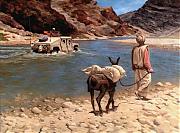I think fundamentally war has changed us – and moreover in a good way. War has offered a means for us to challenge ourselves, our leadership and our profession in ways that do not fit into the context of a largely peacetime Army. In this case the proportion of those effected by the war has grown to a point whereas to provide a bow wave upon which to consider our core beliefs.
I remember reading MG Bolger’s books on the CTCs as a Platoon Leader, then rereading them as a CO CDR – there was not much out there like that at the time – the kind of introspection that challenged the conventional wisdom about our profession. Few were the leaders who either had the means, or felt compelled to explore not only for themselves, but to write it down for others in such a way that it allowed them to challenge things. War has changed that.
How much traction and reflection would a LTC’s thoughts on generalship have generated in 2000, even 2002 when only a small percentage of units had gone to war? How much of what we have experienced now has empowered us up to this point to challenge the status quo? War changes us – it makes us more pragmatic, and it compels us to ask why? LTC Yingling’s article is now part of the CGSC/ILE POI – it gets introduced and discussed in small group forums – would that have happened in 2001? I raise that question because its reflects to me that not only are CO grade and FG officers challenging the status quo, but even some 06s and above are. I was talking with a buddy last night about his first week in the ILE course here – he said their first GO speaker came and the audience wasted no time in asking him about COL McMasters, and why LTC Nagl is leaving.
I guess my point is that while you have some very visible guys they are the well knowns – the top of the iceberg. The reality I feel is that there is a great deal of mass below the water that many on the outside don’t see. It manifests itself in different ways – but the compelling need to question conventional wisdom is there – consider SWC member Gian Gentile, who is an active duty officer, prior BN CDR. He raises some valid questions about the dangers of accepting new ideas on their face value alone – he disagrees – and this is healthy – it provides tension – that tension produces further dialogue which teases out the underpinnings of arguments and often forces us to look in uncomfortable directions. It helps us understand our need to produce “a solution” and move on to other things vs. understanding that some things are not simple mathematical equations that can be added or subtracted to produce a definitive answer – some things must be continuously interacted with, treated, stayed on top of, inter-acted with, managed or what have you, or they will revert to the path of least resistance and cause far more trouble down the road.
Its undeniable in my mind that we benefit from the Nagls, the Yinglings, the Gentiles, and some of the other well knowns who overtly challenge the system. However, I think it would also be wise not to see them as an oddity, or to try and divorce them from the conditions which allowed their arguments to gain traction and spark reaction. These conditions have created an Army that thinks of itself differently. You could be talking about the way some cringe when they see a soldier on a cold day wearing a black fleece jacket and a fleece cap inside the garrison area as part of an authorized duty uniform (the pragmatic reaction to protecting oneself from the cold), or you could be talking about a LTG who writes and encourages others to blog. Hats off to the those above the water – the public needs to see it, and I think those below the water do too, however, don’t discount the mass of the iceberg below the water – it lasts longer, and it provides the real inertia.
Best, Rob







 "A Sherman can give you a very nice... edge."- Oddball,
"A Sherman can give you a very nice... edge."- Oddball, 
 ).
).


 ).
). Sorry way to do business...).
Sorry way to do business...).

Bookmarks